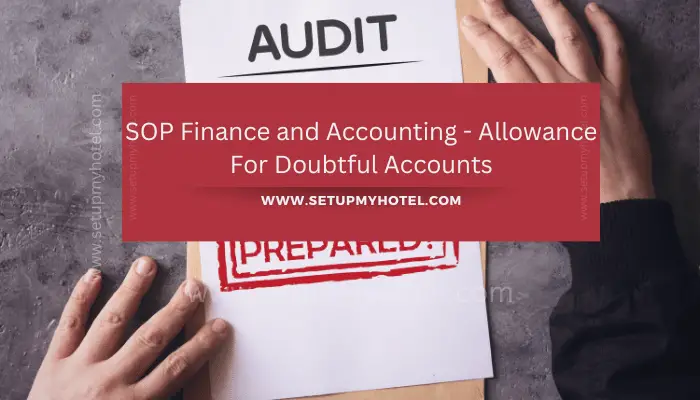AuditAudit is a verification of accounting procedures and records. AllowanceReversal of charges on the guest folio which was posted before the current system / PMS date. For Doubtful Accounts
Purpose of Allowance For Doubtful Accounts :
It is the direct responsibility of the ControllerThe financial Controller�manager is in charge of all accounting functions of a hotel. Duties inclu... to ensure that an adequate. Allowance for Doubtful Accounts exists and all write-offs follow the approval process outlined below.
The Allowance for Doubtful Accounts is a financial term used in accounting that refers to the amount of money a company sets aside to cover the possibility that some of its customers may not be able to pay their debts. This allowance is created to reflect the fact that some customers may default on their payments, which would result in a loss for the company.
The SOP Finance and Accounting provides guidelines for creating and maintaining an accurate Allowance for Doubtful Accounts. These guidelines include identifying accounts that are at risk of default, estimating the percentage of those accounts that may not be paid, and setting aside a corresponding amount of money to cover those potential losses.
The purpose of the Allowance for Doubtful Accounts is to ensure that a company’s financial statements accurately reflect its true financial position. By setting aside a portion of its assets to cover potential losses, a company can present a more accurate picture of its financial health to investors, lenders, and other stakeholders. This is an important aspect of financial reporting that helps to build trust and confidence in a company’s financial performance.
Allowance For Doubtful Accounts SOP Procedures:
ALLOWANCE FOR DOUBTFUL ACCOUNTS
A reserve will be maintained to cover the subsequent write-off of accounts receivable. This should be equal to 3% of non-credit card accounts receivable.
A monthly entry will be made to debit the Bad DebtDebt is the money owed to a person or organization. an obligation. expense in the A&G Department and credit the Allowance for Doubtful Accounts. This amount may be based on an annualized amount.
AUDIT WRITE-OFFS
There will be, from time to time, accounts receivable accounts which will be deemed uncollectible. These accounts will be charged to the Allowance for Doubtful Accounts or to the departmental bad debt expense.
A. If all hotel credit procedures and company policies have been followed and the account is deemed uncollectible, the account should be written off to the Allowance for Doubtful Accounts.
If your write-off reduces the Reserve for Bad Debts to less than 3% of non-credit card receivables. an adjustment needs to be made. to the Reserve accordingly.
B. If an account is transferred to City LedgerLedger is a book of accounts in which business transactions are entered after having been recorded i... and is not billable, the Accounts Receivable Supervisor will make every effort possible to obtain a billing address. In a case where it becomes impossible to bill the account, it will be written off and charged to the bad debt expense of the department that was responsible. Examples of this would include walkouts and non-readable credit card imprints. CIA’s, etc.
Also, if a policy is violated and the account is billed but not collected, the account will be written off and charged to the bad debt expense of the responsible department.
C. Accounts Receivable write-offs should be documented as to the reason, including comments from the appropriate department. All write-offs and adjustments, including credit card rebates, must be approved by the department head. Controller, and General ManagerManager is a person in the hotel operations who is assigned to manage or supervise a group of employ....
D. Accounts are to be written off when they are determined to be uncollectible, but in no case are they to be retained on the books beyond 180 days.
Unidentified credit balances in the 180-day age category are to be written off as a credit to Allowance for Doubtful Accounts.
Except for items previously written off to a departmental bad debt expense, all recovery of Bad Debt previously written off is to be credited to the Allowance for Doubtful Accounts. Recovery of items written off to a departmental expense should be credited to the expense where it was originally charged
Training Summary Questions:
Q1. What is the write-off policy for accounts receivable?
Q2. What happens if an account is transferred to City Ledger and is not billable?
Q3.Who should approve all write-offs and adjustments, including credit card rebates?
Q4. What are the criteria for writing off bad debt expenses?
Patreon Only SOP Download
SOP Number: Finance and Accounting SOP – 31
Department: Accounts Receivable
Date Issued: 8-Aug-2021
Time to Train: 25 Minutes












